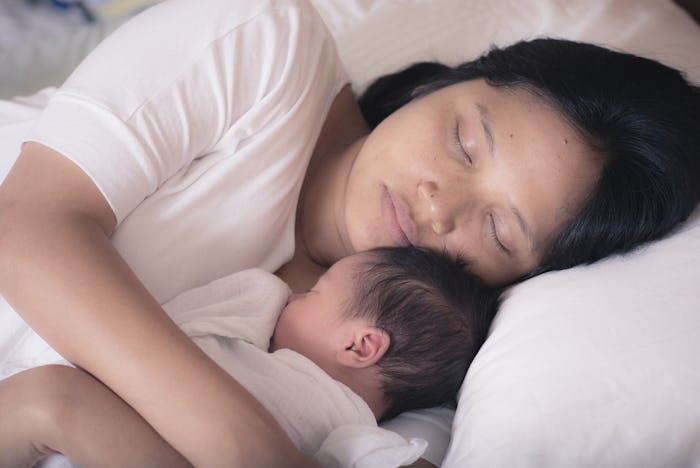Life

7 Ways Co-Sleeping Helps With Your Anxiety
Parenting and anxiety kind of go hand-in-hand, especially with that whole lack of sleep thing. (Ugh.) Making parenting decisions when you're constantly stressed is no fun and it can make you panicky and anxious, but there's one that might be able to solve everything — co-sleeping. If the thought of co-sleeping makes you even more nervous and worried, I get it, but there are actually a few ways co-sleeping helps with your anxiety.
Even if you don't have an actual diagnosed anxiety disorder, you may struggle with worrying over your child or feeling nervous about their well-being. When it comes to sleep, it's especially difficult to turn off all of the "what ifs" running through your brain. The Telegraph noted that researchers have conducted studies that found babies' sleep was often disrupted by mothers with anxiety and not the other way around. Mothers who felt anxious would go and wake their baby up, check on them so often through the night that the baby didn't sleep well, and rush to every sound the baby made.
Sound familiar? I get it, but there could be a solution. Co-sleeping could make some of your anxiety disappear at bedtime, whether it includes your child sharing a bed with you or sleeping in their own cot or crib in your room. You won't have to check on them throughout the night or rush to every sound they make because they are right there, sleeping soundly. Co-sleeping can help with your anxiety in these seven ways and create a good night's sleep for everyone.
1It Takes Away The Anxiety & Stress Of Bedtime
There are few things more stressful to both parents and kids than bedtime. Whether it's because your kids are scared of the dark or because they simply want to be with you, co-sleeping can take away some of that anxiety. Kelly Mom noted that there are fewer bedtime hassles when you co-sleep, which can make bedtime a whole lot easier and even more enjoyable.
2It Can Help You Protect Your Baby While They Are Sleeping
Feeling anxious about your baby's breathing or heart rate while they're sleeping? Understandable. But you don't have to let your anxiety get the best of you. According to La Leche League International, your body can actually protect your baby by regulating their breathing when you co-sleep. The Mother-Baby Behavioral Sleep Laboratory of the University of Notre Dame noted that your body also provides the physiological regulation and support your child needs just by sleeping near them.
3You Can Understand Your Baby's Patterns Better Throughout The Day
All of that co-sleeping can increase more than just snuggles. An article from Attachment Parenting International noted that co-sleeping parents reportedly feel more sensitive to their child's needs, therefore making them more receptive to their child's patterns during the day. A lot of parenting anxiety is built up when you don't know what your child needs, but apparently, co-sleeping can help you become an expert on your little one.
4It Helps You Get More Uninterrupted Sleep
Major bonus, right? It's no secret that sleep is necessary, but according to Anxiety and Depression Association of America, anxiety can cause sleep disorders and a lack of sleep can cause anxiety. Kelly Mom noted that parents and babies often get more sleep when co-sleeping, so racking up on those Zs may save you from feeling anxious down the line.
5It Reduces Overall Anxiety With Skin To Skin
Co-sleeping usually means lots of snuggling and skin to skin, especially with a breastfed baby. Luckily, that skin to skin contact can actually reduce your anxiety according to one study. You and your baby both need that touch, so score some extra contact while you're sleeping.
6It Helps Maintain Your Milk Supply
Nobody wants to worry about their breast milk supply, right? Kelly Mom noted that breastfeeding at night helps maintain your milk supply and having your little one right there makes breastfeeding super easy. You won't sleep through any feedings because your baby is right there when they are hungry and you won't have to fully wake to walk across the house, you can simply bring your baby to bed with you.
7It Reduces The Risk Of SIDS By 50 Percent
If your baby's bed-sharing, this statistic doesn't apply, but according to a 2011 article from the American Academy of Pediatrics, room-sharing (not bed-sharing) can reduce your child's risk of SIDS by as much as 50 percent. How's that for lowering your anxiety? Again, the important thing to remember is that this statistic is about room-sharing, not bed-sharing. Your baby must be asleep in their own cot or crib in order to reduce the risk of SIDS, but having them in your room can keep them safe and you relaxed.